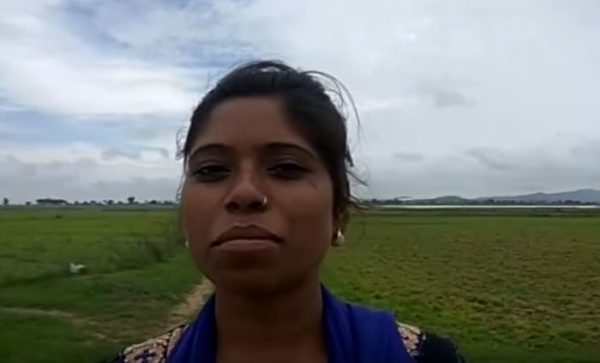If this were an episode off the Nat Geo show, we would have to say: Adult Female, Rare Sighting, Ineffectual Prowess!
The mahila pradhan is a curious creature in rural India. She is of a species borne out of the system, very much a part of the reservations quota introduced at the village level and yet – or perhaps because of it – she remains pradhan only in name. Because where there is a system, there are tens of thousands of loopholes and convenient lip service mechanisms.
In several districts of Bundelkhand wherever and whenever we have reported on the mahila pradhans, we have found ourselves traversing the spectrum of disillusionment – from disappointment to rage, we have felt it all. Because in almost all of our visits to and interviews with mahila pradhans, we have had to encounter the phenomenon, the appendage that goes along with her.
We call him the Pradhan Pati.
It’s a simple game. Get the woman of the house to stand for elections – once she wins, step in, and hog all the seconds available to you in the 15-minute slot. In any case, she’s busy doing the housework, looking after the children, slogging at the fields, etc.
And so, imagine our surprise when we meet her.
“Marriage is definitely not on the cards for now”, she says – a statement as rare as the active mahila pradhan herself. Her name is Priyanka and she has been elected pradhan of her village, Sarhat gaon, in Chitrakoot’s Manikpur Block.
We have come to meet her, because she is all of 23. If a working mahila pradhan is still unusual in these parts, then a 23-year-old mahila pradhan calls for a downright celebration.
Especially one with radical views on domesticity. “See, marriage becomes the end of everything for the woman,” explains Priyanka, qualifying her statement earlier, as she continues, questioning it. “Nobody wants the woman to even step foot outside the house once she’s married.” “Baahar toh bahut samasyaaein hain, (Oh, there are so many problems outside) everyone tells her,” Priyanka mimics the well-wishers who do that, and adds, “So it’s better for you to stay indoors.” She smiles, and adds, “Stay indoors and do the housework.”
But Priyanka has chosen to step outside and stay in the outdoors, as much as possible. Whether it’s supervising the construction of the water tank that she’s just undertaken for the village, or convening a meeting of the block co-ordinators to discuss the logistics of the next mapping project planned in their locality, Priyanka is very much a girl at large. Not that she is averse to domestic chores or to handling responsibilities at home: Her day starts at 6:30 am, she tells us, because it’s Priyanka’s job to send her younger brothers to school. She packs their tiffins, and makes sure they’re ready to leave. “School is very important. An education is very important,” she says.
We learn more about the course of her day, which includes setting off in the afternoon to manage the block-related duties. There’s always paperwork that’s waiting, and “too many signatures”, she mock-complains.
Back at home in the evening, Priyanka cooks dinner for her family, which includes her parents and her brothers. And right before bedtime, she tells us, she sits down with all the panchayat-related issues. These range from legal matters – a lot of domestic abuse problems, land-grab quarrels – to matters concerning development. “One of the biggest problems here is water”, she tells us and it’s on her fairly long to-do list of problems to solve or abet, in her term as Pradhan. Others include, in order of priority, “Getting shauchalays constructed. Ensuring awaas and colony for all. Regulating the ration cards system.”
Priyanka is very aware of the image of the village pradhan in everyone’s minds, especially her fellow village residents.
“Oh, it’s the usual stuff”, she says, smiling, “That they never do any work. That they’re not interested in welfare or development or other issues that plague everyone.” But Priyanka is keen to break with it, and deliberately so. “When people say, ‘Arre, chunaav ke time toh haath jodkar aate hain, aur uske baad dekhne bhi nahi aate hain’ (Oh, they come folding their hands when it’s time to vote, and after that, cannot be seen anywhere)’, I think it’s the worst thing you could say about someone who’s run for the post. That person is a pratinidhi (representative) for reason – it should not be abused.” The biggest accusation that Priyanka wants to invert is the one about pradhans pocketing all the money they’ve been allotted – this one leaves her shocked beyond belief.
As we walk around Sarhat with Priyanka, people greet her and come to meet her – the village has a population of about 800-odd and is 28 kilometers from Karwi, the “town” signifying aspiration. There has been much excitement about the “teis saal ki ladki” who has become pradhan – we are not alone in that. She takes us to the naalis and khadanjas and water tanks and ponds she’s getting built – some of them just budding projects – and the pride in her voice as she talks about each of them is apparent.
We learn that the absolute importance she places on a good education is not simply for her brothers.
Priyanka herself intends to go back to studies very soon, and she’ll continue the pradhangiri alongside, she says. This, we learn, is her gap year.
Just so she isn’t completely out of touch, she spends an hour every night, after she’s sorted through the panchayat-related work, doing “padhaai-likhaai”. For Priyanka, this is her sacred me-time. After all, she says, “Apne liye bhi toh kuch time hona chahiye. Tabhi toh kuch aur bhi kar paaoge. (One should have some me-time. Only then can you do something more.)”
Now that, we agree, is unbeatable logic!





Leave a reply